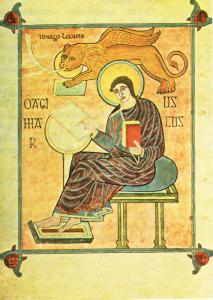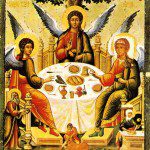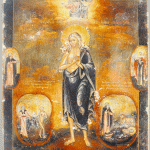
As a society, we encourage people not only to be prideful, but also to be narcissistic, so that they think all they need to do is live their lives fulfilling their every whim, even if it comes at the expense of the common good. Most of us have learned that lesson well. We try to make ourselves the center of the universe, subjecting everything to us as if our will, our desires, was absolute. We not only think we know more than we actually do, we think everyone else should want to listen to what we have to say, on any and everything we should talk about. We act like we are wise sages looking down from on high and everyone should be grateful for whatever words of advice we should give. Our every thought, we believe, is worthy to be listened to and shared, as if it were a gem to be treasured by all.
Of course, we can and should share the wisdom we have. It is important, however, that we have something worthy to share. It is also important that we should share our wisdom with those who actually want to hear what we have to say. And, of course, we should be humble, recognizing that no matter how much we know, no matter how wise we might be, we don’t know everything. We should accept our limitations, and acknowledge them when we should speak to others. And we certainly should not take upon ourselves the role of teacher, the role of someone possessing authority, if we are not truly qualified to teach those things we would like to speak on. For, as James warns us, if we should take on the role of teacher, when we are not qualified or called to be one. we risk facing greater judgment or criticism because of our presumption, than if we remained silent. “Let not many of you become teachers, my brethren, for you know that we who teach shall be judged with greater strictness” (Jas. 3:1 RSV). Obviously, if we are not qualified, we are likely to lead others, as well as ourselves, astray. And, because we presumed to take on a role we should not have done, that will cause us to be that much more responsible for whatever harm we cause by speaking when we should have been silent.
It should not be surprising that many who have entered the religious life have had to be reminded that they should not take on the role of teacher. For the religious life is not to be assumed as a way to prop oneself off as superior to others, but to embrace humility. Thus, we can read how monastic superiors, thanks to the wisdom of their experience, if not their study, warned other monks not to take on the role of teacher because they would find their way of life is best kept if they were humble and sought to learn from others instead of presuming to speak as if they were an authority: “An elder said, ‘I would rather be taught than teach.’” [1] It is, of course, an ironic statement, because by stating it, the elder became a teacher. And yet, another statement which he apparently said, pointed out that we can become teachers if and when the context suggests it is necessary. We must learn how to judge when the time is right, but if we can’t, then it is best to be silent: “He also said, ‘Do not teach before it is time, otherwise you will be diminished in understanding the whole time.’” [2]
What is important is that we should recognize the danger involved in becoming a teacher. If we lead someone astray, we find ourselves culpable, at least in part, for what they do. The more we promote ourselves as authorities, the more we will be held responsible for happens as a result of our words. If we are blind to the dangers involved with such presumption, pride will encourage us to speak up and defend ourselves when our authority is questioned. Then, as James said, we will become taken over by our speech, and what we say will show the inner workings of our heart, allowing the darkness which remains within it to take control and hurt not only ourselves but others as well:
So the tongue is a little member and boasts of great things. How great a forest is set ablaze by a small fire! And the tongue is a fire. The tongue is an unrighteous world among our members, staining the whole body, setting on fire the cycle of nature, and set on fire by hell (Jas. 3:5-6 RSV).
The fires of hell can be said to be fueled by our heart; if we let them grow, we will find that they cause much pain and sorrow, both to ourselves, and to those around us. The wise teacher knows this; they know if the fires of hell are not extinguished, they will spread and consume our hearts. They knew humility helps put them out, because with humility, we form better relations with others, and the better our relations with others, the more charity and love we will possess, covering the sins which otherwise fuel the fires of hell. Thus, one monk suggested we should go around making amends with others, realizing (as many modern addiction programs realize) that our bad relations with others often is the cause of our own internal demons: “One of the fathers said, ‘If someone with a humble mind says to another, ‘Forgive me,’ he burns up the demons.’”[3]
We certainly need wise men and women to be teaching us what they know and understand. They should hold an important place in our spiritual, religious, and social development. However, not everyone will have the wisdom, knowledge, and skill set to become teachers. Even if someone has a lot of knowledge to share, that alone, is not enough to make them a spiritual authority. Only those who have undergone spiritual transformation and development, and through it, have developed humility and love, have the wisdom needed to hold such a position. Teachers do not have to be perfect, or close to perfect, for few are. However, they should at least undergone spiritual development, and in such a way have become someone better than they were when they first begun their spiritual journey. That way, they will have seen and overcome many of the pitfalls the rest of us have to face and will be able to give advice as to how to deal with them. Those who would be teachers, therefore, need to offer more than rote facts or speculative theory, they need to be able to speak on what they have experienced and shown that they have put their words into action. If they have not, then it is likely that they will eventually find themselves dealing with issues beyond their knowledge and comprehension. Then their pride could get in the way, for instead of admitting their deficiencies, they will want to look like they are authorities, and so they will speak and give bad advice, leading not only those who listen to them, but themselves, down the wrong path.
[1] John Wortley, trans. The Book Of The Elders: Sayings of the Desert Fathers (Collegeville, MN: Cistercian Publications, 2012), 271 [N 668]
[2] John Wortley, trans. The Book Of The Elders: Sayings of the Desert, 271 [N 669]
[3] John Wortley, trans. The Book Of The Elders: Sayings of the Desert Fathers, 271 [N 320a]
Stay in touch! Like A Little Bit of Nothing on Facebook.
If you liked what you read, please consider sharing it with your friends and family!
N.B.: While I read comments to moderate them, I rarely respond to them. If I don’t respond to your comment directly, don’t assume I am unthankful for it. I appreciate it. But I want readers to feel free to ask questions, and hopefully, dialogue with each other. I have shared what I wanted to say, though some responses will get a brief reply by me, or, if I find it interesting and something I can engage fully, as the foundation for another post. I have had many posts inspired or improved upon thanks to my readers.













